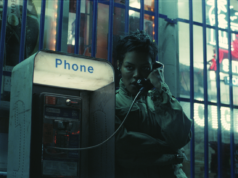Who knew that ballet was a blood sport? During the last couple of days, local arts sites have been abuzz over the stepped-up rhetoric between Texas Ballet Theater and the DFW Professional Musicians Association union over the use of recorded music during TBT’s shows.
I’m not a dance critic, though I have seen a number of professional dance performances, especially in my early years as an arts writer. Many of those were internationally renowned touring companies brought to North Texas by TITAS. They were staged at SMU’s McFarlin Auditorium in Dallas to the accompaniment of recorded music. The best of them were absolutely thrilling – the kind of kinetic beauty that engaged me so much I was only barely aware of moving in my own seat, unconsciously trying to project my body into those of the soaring onstage artists.
I’m a big enough “dance rube” not to know what I’m missing when a great live orchestra accompanies a great ballet company. However, my bullshit detector is also discerning enough to hit the red zone at some of the rhetoric being used by musicians union spokesman Ray Hair. Accusations that TBT is swindling arts patrons and “fouling” an art form sound very high-minded, and yet…
Here’s the reality: Good ballet can be performed – indeed, is performed, all over the world – to recorded music. Ballet artists don’t need live musicians the way live musicians need the ballet for gigs. Somewhere deep in their hearts, Ray Hair and his fellow musicians know this, and it really rankles. Because of this – and this is just my opinion — they want to destroy a nationally accomplished ballet company that routinely earns great reviews and audience praise even with canned Tchaikovsky.
To be sure, Texas Ballet Theater is not an innocent victim. Their financial woes – which remain murky and questionable even after considerable press scrutiny – appear to be self-inflicted, and have made them vulnerable. In the end, they may turn out to be their own worst enemy. But TBT’s core audience, especially the season ticketholders, should determine if an imperfect ballet experience – that is, one with recorded music — is good enough for the forseeable future. Unfortunately for the DFW musicians union, I suspect many local ballet fans would rather have a TBT with compromises than no TBT at all. As long as Hair et al are essentially saying, “If you don’t employee us, then we want to make sure a bunch of other artists — in this case, dancers — are unemployed, too,” they won’t get much public sympathy for their cause.












Margo McCann recently told the Fort Worth Star-Telegram that the ballet company saved $600K to $700K by eliminating live music. Was this the same $700K, unreported in TBT IRS filings and collected by two of the company’s board members prior to its financial “collapse” just before the orchestras were silenced? Board members of non-profit groups are generally expected to serve without compensation. Not so at TBT. Are the personal pecuniary interests of two of the company’s board members – one, Jeanne Marie Clossey, now sits on the AT&T Center’s executive committee – worth an entire season of orchestral accompaniment? If you could choose, would you endorse the six-figure annual sums received by these company board members or the magic of genuine classical ballet with a live orchestra, just as the composer intended and that TBT, Bass Hall and the AT&T Center long ago priced into the cost of admission? The box office gross potential from ten TBT/Bass Hall or ten TBT/AT&T Center Nutcracker presentations is estimated to be about $1.5 million compared to about $125,000 in orchestra costs for a run of ten shows, and is less than 20% of the $660,000 annual salary reportedly earned by AT&T Center CEO Mark Nerenhausen. The promoters of the new Center have heralded it as a “cultural cornerstone,” yet the Center continues to advertise performances by its resident ballet company with online images of a live orchestra, despite the Winspear’s empty orchestra pit. It is against this background that we ask how $350 million can buy more glory for the Dallas Arts District but more pain for professional musicians. The facts are indisputable – the arts donors and patrons paid for live music, but they won’t get it.
Little Ray-Ray One Note. Same old cut-and-paste response that he plasters on every site.
To solve complex problems, it is often necessary to think outside the box, not to stuff everything into the same old box. Someday, hopefully sooner than later, the orchestra will be back in the pit for the ballet. But Little Ray-Ray One Note is not assisting that eventuality one bit.
The message is indeed the same, no matter how many different ways Texas Ballet Theater and friends try to deflect it.
Ballet requires live music. Ask any dancer who has ever had to compromise spontaneity to “accompany” a stereo system, or nearly broken a leg trying to keep up with a recorded track that is the wrong tempo. Ask any patron who has ever wanted to plug his ears rather than be subjected to the harshness of a machine.
If you do not know what you are missing without a live orchestra for the ballet, Mr. Fowler, then you have proven the musicians’ point regarding the degeneration of our culture.
Larry
What Ray has to say…is important. The board, donors and patrons need to know the truth about the TBT.
It’s ugly….but important. Ray and others…are trying to help these folks out of a deep hole they’ve dug for themselves….and I’m not talking money.
And Jimmy….you mention “bullshit detector”….
“GOOD” ballet is NEVER performed with recorded music. Average, sort of good, might be tolerable, kind of ok….any number of other phrases reflecting mediocrity would better describe the ART FORM called ballet….with canned music. Name of the company….means nothing. It they use canned music, they are compromising the art form. It’s NOT “good”, great and especially not (as the TBT likes to say) “World Class”….
Here’s a review all should read:
http://artsblog.dallasnews.com/archives/2009/12/yeah-recorded-nutcracker-music.html
“If one hears bad music it is one’s duty to drown it by one’s conversation”. — Oscar Wilde: The Picture of Dorian Gray (1891)
The orchestras have contracts and have already been paid. I regularly attend TBT performances and orchestra performances equally. I do not mind and sometimes don’t even notice that the TBT is using recordings of music. When I’m at the ballet, I’m there to see the dancing, not listen to a live orchestra. Stop your senseless arguing.